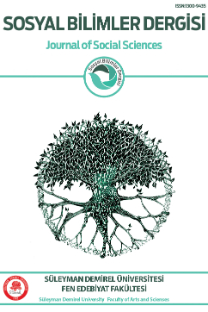Nation vs. region: Turkish serials and the fail of Mission of Bulgarian historiography to construct Grand narrative of so called Bulgarian national revival epoch
___
Атанасов, Димитър, Маргинализацията на академичния исторически разказ, Маргиналното в/на литературата, София, 2011, с. 536 562 (Atanassov, D. Marginalization of academic history narrative, Marginality in/of literature, Sofia, 2011, p. 536 562).Ботев, Христо, Народът вчера, днес и утре, Събрани съчинения, т. 2, София, 1958, с. 35 41 (Botev, Hr. The people yesterday, today and tomorrow, Collected works, t. 2, Sofia, 1958, p. 35 41)
В търсене на българското. Мрежи на националната интимност (XIX XXI век), София, 2010.
Иванова, Евгения, Османското завладяване на Балканите. Митотворчески интерпретации, Slavia Meridionalis. Studia linguistica Slavica et Balcanica, Warscawa, 5, 2005, p. 233 252 (Ivanova, E. Ottoman conquest of Balkans. Myth-creating interpretations).
Уайт, Хейдън, Практическото минало, Социологически проблеми, 3-4, 2010, с. 122 140 (White, H. The practical past, Sociological problems, 3-4, 2010, p. 122 140).
Altbach, Phillip, Patty McGill Peterson, Higher Education as a Projection of Americas Soft Power, Watanabe Y., D. L. McConnell (eds.). Soft Power Superpowers: Cultural and National Assets of Japan and the United States, NY, 2008, p. 37 51.
Edelstein, Alex, Total Propaganda: From Mass Culture to Popular Culture, New York, 1997.
Fraser, Matthew, American Pop Culture as Soft Power. Movies and Broadcasting, Watanabe Y., D. L. McConnell (eds.). Soft Power Superpowers: Cultural and National Assets of Japan and the United States, NY, 2008, p. 172 187.
Fraser, Matthew, Weapons of Mass Distraction: Soft Power and American Empire. New York, 2005.
Kiossev, Alexander, Virtual Communities vs Imagined Communities. Festivities. Reading, Chatting, LiterNet, 25.02.2000, № 2 (3).
Kuisel, Richard. Seducing the French: The Dilemma of Americanization. Berkeley, 1993.
Mackenzie, G. M.; A. P. Irby, Travels in the Slavonic provinces of Turkey-in Europe, London, 1867.
Miller, Toby, Television studies: the basics, New York, 2010.
Nieborg, David, Empower yourself, defend freedom! Playing games during times of war. van den Boomen, M.; S. Lammes, A. Lehmann, Joost Raessens, and M. Schäfer (eds.). Digital Material. Tracing New Media in Everyday Life and Technology, Amsterdam, 2009.
Nye, Joseph, Bound to Lead: The Changing Nature of American Power, New York, 1991.
Nye, Joseph, Soft Power: The Means to Success in World Politics, New York, 2004.
Pells, Richard, Not Like Us: How Europeans Have Loved, Hated, and Transformed American Culture Since World War II. New York, 1997.
Schmale, Wolfgang, Geschichte Europas, Wien-Köln, 2000.
Seibt, Ferdinand, Das Begründung Europas, Frankfurt am Mein, 2002. Textbooks used:
History of Bulgaria. Textbook for 11-th class of GES, by A. Burmov, D. Kossev and H. Hristov, Sofia, 1957.
Ognyanov, L.; M. Lalkov, M. Radeva, S. Trifonov, V. Kolev. Essays about Bulgarian history (1878 - 1948). History for pupils, teachers and parents, Sofia, 1992.
Textbook for 5-th class of GES, by V. Mutafchieva, R. Gavrilova, Sofia, 1994.
Textbook for 6-th class of GES, by E. Agibalova, G. Donskoy, P. Petrov and S. Parashkevova, Sofia, 1978.
Textbook for 6-th class of GES, by M. Lalkov, M. Radeva, L. Zidarova, Sofia, 1994.
Textbook for 7-th class of GES, by G. Georgiev, Z. Stancheva and P. Drazhev, Sofia, 1979.
Textbook for 8-th class of GES, by H. Matanov, G. Sotirov and L. Stanchev, Sofia, 1994.
Textbook for 9-th class of GES, by V. Giuzelev, K. Kossev, G. Georgiev, Sofia, 1981.
- ISSN: 1300-9435
- Yayın Aralığı: 3
- Başlangıç: 1995
- Yayıncı: Süleyman Demirel Üniversitesi, Fen-Edebiyat Fakültesi
World War I in the Balkans, 1914-1918 Third Balkan War?
Illegal Migrations Along the Balkan Routes
Edward Grey And The First Balkan War
The European Union Policy towards the Balkan States in the Post-Cold War Era
Implications of Dayton Peace Agreement on current political issues in Bosnia-Herzegovina
